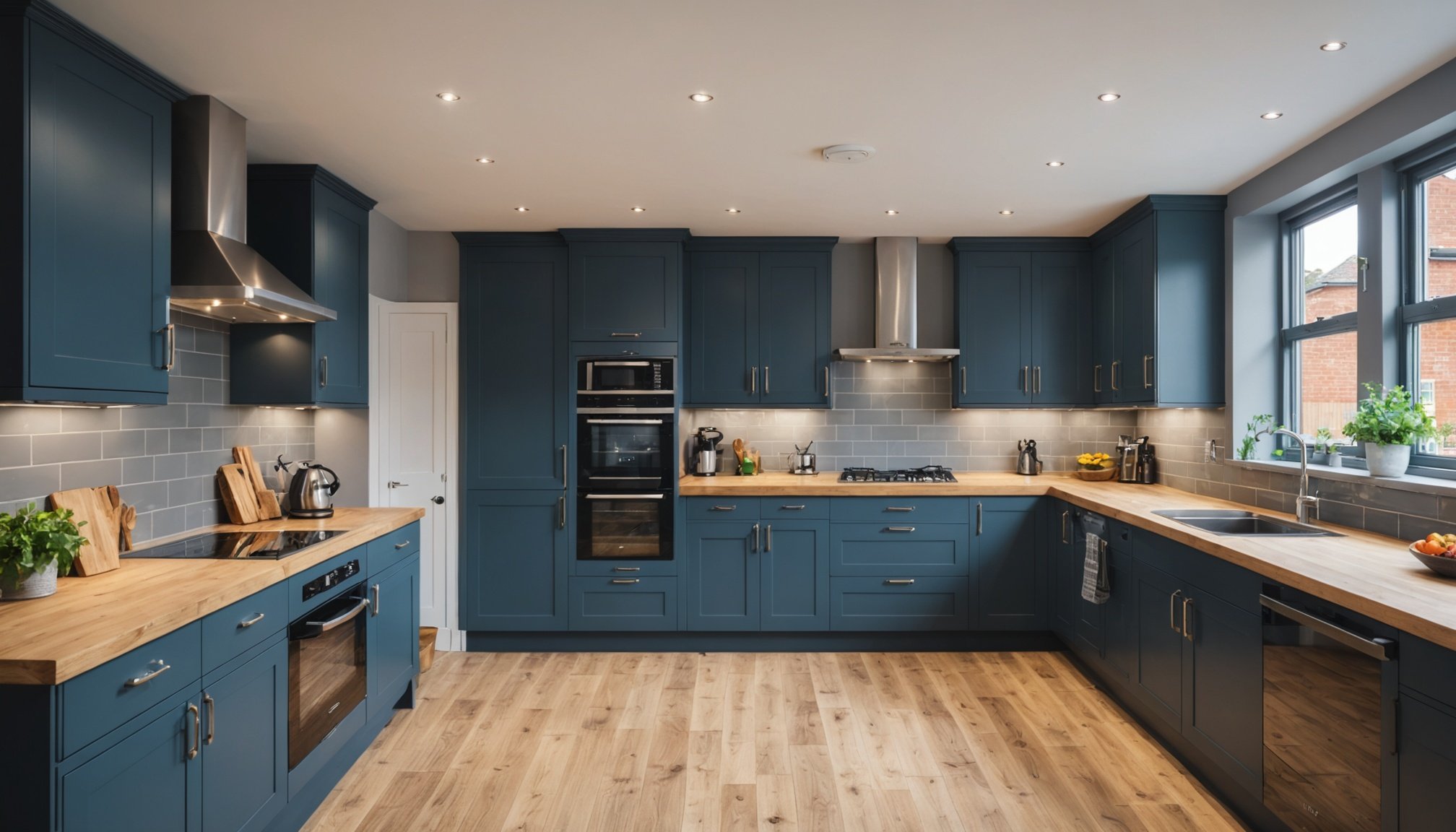Mastering UK Building Regulations: A Comprehensive Guide for Your Kitchen Renovation
When embarking on a kitchen renovation, one of the most critical aspects to consider is compliance with UK building regulations. These regulations are in place to ensure that your renovation is safe, efficient, and meets the required standards. Here’s a detailed guide to help you navigate through the process, making your kitchen renovation a success.
Understanding UK Building Regulations
UK building regulations are a set of rules that govern how buildings are constructed, extended, or altered. These regulations cover various aspects, including structural integrity, fire safety, accessibility, and energy efficiency. For a kitchen renovation, you need to be particularly aware of the regulations related to electrical installations, plumbing, ventilation, and insulation.
Also read : Mastering Kitchen Design: Expert Tips to Effectively Minimize Cooking Odors
Key Areas to Focus On
- Electrical Installations: Ensure that all electrical work is carried out by a qualified electrician and meets the standards outlined in the Building Regulations 2010, specifically Part P.
- Plumbing: Comply with the Water Supply (Water Quality) Regulations 2010 and the Building Regulations 2010, Part G, which cover hot and cold water systems, and sanitation.
- Ventilation: Proper ventilation is crucial. Refer to Building Regulations 2010, Part F, which details the requirements for ventilation in kitchens to prevent moisture buildup and ensure air quality.
- Insulation: Meet the energy efficiency standards outlined in Building Regulations 2010, Part L, to ensure your kitchen is well-insulated and energy-efficient.
Planning Your Kitchen Renovation
Before you begin, it’s essential to plan your kitchen renovation carefully. Here are some steps to follow:
Assess Your Needs
- Consider your cooking habits, entertaining needs, and storage requirements. For example, if you frequently host dinner parties, you might need more counter space and seating.
- Think about the layout and how it will affect the flow of your kitchen. A well-designed layout can make your kitchen more functional and efficient.
Create a Budget
- Determine how much you are willing to spend on your renovation. This includes materials, labor costs, and any necessary permits.
- Consider the cost of compliance with building regulations. While it may add to your initial costs, it ensures your renovation is safe and legal.
Obtain Necessary Permissions
- Check if you need planning permission for your renovation. For most internal kitchen renovations, planning permission is not required, but if you are planning an extension, you may need to apply.
- Ensure you comply with the Party Wall Act 1996 if your renovation involves shared walls with neighboring properties.
Designing Your Kitchen
Design is a critical phase of your kitchen renovation. Here’s how to ensure your design complies with building regulations:
This might interest you : Mastering the Art of Kitchen Illumination: Creating a Flawless Harmony of Natural and Artificial Light
Space and Layout
- Use a professional designer or architect to help you create a layout that maximizes your space while adhering to building regulations.
- Consider the 'work triangle' concept, where the sink, stove, and refrigerator form the points of a triangle to optimize workflow.
Materials and Finishes
- Choose materials that meet the required standards. For example, ensure your flooring and countertops are durable and meet the slip resistance standards.
- Consider eco-friendly and sustainable materials to enhance the energy efficiency of your kitchen.
Building Regulations for Extensions
If your kitchen renovation involves an extension, there are additional regulations to consider:
Rear Extensions
- For single-storey rear extensions, you can extend up to 8 meters for detached houses and 6 meters for semi-detached or terraced houses without needing planning permission, under the permitted development rights. However, you must comply with the Neighbour Consultation Scheme.
- Ensure the extension does not exceed the height of the original house and does not extend beyond the rear wall of the original house by more than the specified distances.
Storey Extensions
- For storey extensions, planning permission is usually required. These extensions must comply with building regulations regarding structural integrity, fire safety, and accessibility.
- Consider the impact on your neighbors and ensure that the extension does not overlook their properties.
Practical Tips for Compliance
Here are some practical tips to help you comply with UK building regulations during your kitchen renovation:
Hire Qualified Professionals
- Always hire professionals who are certified and experienced in their fields. For example, use a certified electrician for electrical installations and a qualified plumber for plumbing work.
Keep Records
- Keep detailed records of your renovation, including plans, permits, and inspection reports. This will be useful if you decide to sell your property in the future.
Regular Inspections
- Ensure that your renovation is inspected at various stages by local building control officers. This helps in identifying any issues early on and avoiding costly rework.
Cost Considerations
Compliance with building regulations can add to the cost of your renovation, but it is essential to avoid future complications and ensure safety.
Budget Breakdown
Here is a rough breakdown of the costs you might incur:
| Cost Component | Estimated Cost Range |
|---|---|
| Materials | 30% – 40% of total budget |
| Labor | 40% – 50% of total budget |
| Permits and Inspections | 5% – 10% of total budget |
| Design and Planning | 5% – 10% of total budget |
| Miscellaneous (Contingency) | 5% – 10% of total budget |
Long-Term Savings
- While complying with building regulations may increase your initial costs, it can lead to long-term savings through energy efficiency and reduced maintenance costs.
Mastering UK building regulations is crucial for a successful kitchen renovation. By understanding the key areas of focus, planning carefully, designing with compliance in mind, and following practical tips, you can ensure your renovation is both safe and legal.
Final Checklist
Before you start your kitchen renovation, make sure you:
- Understand the regulations: Read and understand the relevant building regulations.
- Plan meticulously: Create a detailed plan and budget.
- Hire professionals: Use certified and experienced professionals.
- Obtain necessary permissions: Ensure you have all the required permits.
- Keep records: Maintain detailed records of your renovation.
By following this guide, you can transform your kitchen into a beautiful, functional, and compliant space that enhances the value of your home. Remember, compliance with building regulations is not just a legal requirement; it’s also a way to ensure your home is safe and efficient for years to come.











